Isn't it just your luck that on the day you're searching for the best all-day sunscreens, we're here discussing the very topic? When you're planning to spend your day outdoors, choosing the right sunscreen is crucial, not just for preventing sunburn but for shielding your skin from long-term damage. You should look for products that offer broad-spectrum protection, are water-resistant, and have a minimum SPF of 30. But here's the kicker: not all sunscreens are created equal, and there are specific types that may be more suited to your skin's unique needs. So, how do you choose the right one? Let's explore some options that might just change how you enjoy your sunny days.
Key Takeaways
- Choose sunscreens with SPF 50 for optimal UVB protection and broad-spectrum coverage against UVA rays.
- Ensure sunscreen is labeled water-resistant for 80 minutes, ideal for prolonged exposure and activity.
- Reapply sunscreen every 2 hours, or immediately after swimming, sweating, or toweling off.
- Opt for formulations with added antioxidants like vitamins C and E to combat free radical damage.
- Select sunscreens with hydrating ingredients such as hyaluronic acid or glycerin for all-day skin moisture and comfort.
Understanding SPF and Broad-Spectrum Protection
Understanding SPF (Sun Protection Factor) and broad-spectrum protection is essential for effectively shielding your skin from the sun's harmful rays. SPF quantifies how well a sunscreen can protect against UVB radiation, the primary cause of sunburn. However, it doesn't measure protection from UVA rays, which penetrate deeper into the skin and are associated with premature aging and skin cancer. That's where broad-spectrum protection steps in, safeguarding you from both UVA and UVB rays.
You've likely encountered SPF myths, such as "SPF 100 offers double the protection of SPF 50." In reality, SPF 50 blocks about 98% of UVB rays, while SPF 100 blocks about 99%. The difference is marginal, emphasizing that higher SPF ratings don't guarantee significantly better protection.
Another common misconception is that once applied, sunscreen protects for the whole day. Sunscreen actually needs reapplication every two hours, especially after swimming, sweating, or towel drying.
Choosing the right sunscreen involves looking for broad-spectrum labels and considering the SPF suitable for your exposure time and skin type. Remember, no sunscreen can block 100% of UV radiation, so combining sunscreen with other protective measures like clothing and shade is crucial for comprehensive sun protection.
Best Sunscreens for Sensitive Skin
If you have sensitive skin, finding a sunscreen that doesn't cause irritation while still offering effective protection can be a challenge.
You'll want to look for products specifically designed to minimize risk and cater to your skin's needs. Sunscreens labeled "fragrance-free" and "hypoallergenic" are typically formulated to avoid common irritants that can trigger skin allergies.
It's crucial to select mineral-based options, like zinc oxide and titanium dioxide, which sit on top of the skin rather than being absorbed, reducing the likelihood of irritation.
Moreover, it's advisable to test the sunscreen on a small skin area before full application. This patch test can help you determine if you'll have an adverse reaction without exposing a large area to potential irritants.
If you react negatively, consider consulting with a dermatologist. They can provide treatment options and recommend sunscreens that have been clinically tested for sensitivity issues.
Top Water-Resistant Sunscreens
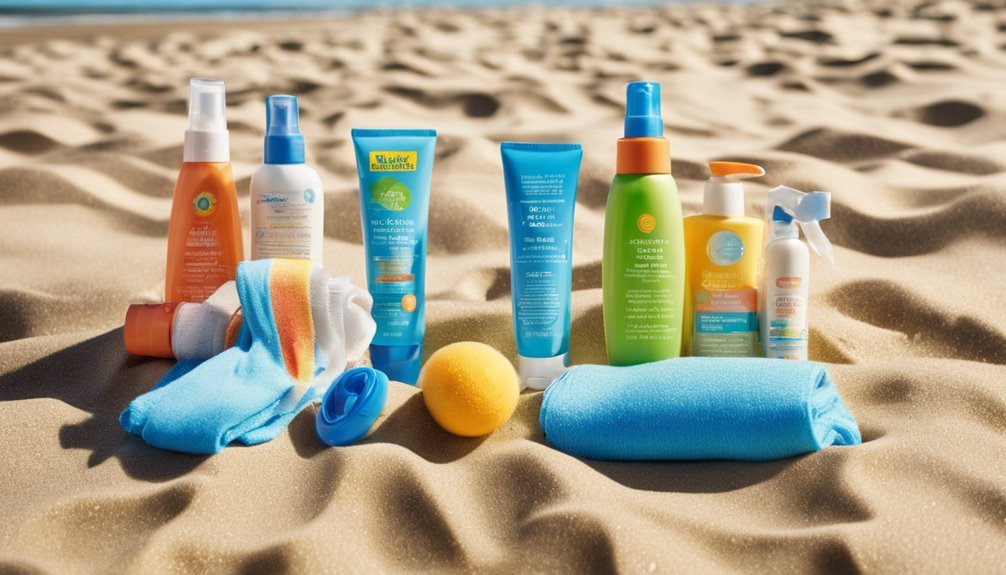
When you're planning a day at the beach or an outdoor adventure, choosing a water-resistant sunscreen is essential for maintaining lasting skin protection. Waterproof formulations are specifically designed to adhere to your skin better when in contact with water or sweat, making them ideal beach essentials.
These sunscreens maintain their SPF protection for a longer period, even after you swim or sweat, reducing the need for frequent reapplication.
Look for products that boast "water-resistant" labels, indicating that they can withstand 40 to 80 minutes of water exposure. The active ingredients in these formulations, such as zinc oxide and titanium dioxide, provide a physical barrier that reflects UV rays away from your skin. This is critical because prolonged UV exposure can lead to skin damage and increase the risk of skin cancer.
Moreover, it's important to apply a generous amount of sunscreen at least 15 minutes before sun exposure. Make sure to cover all exposed skin and reapply immediately after swimming, toweling off, or sweating.
Sunscreens for Acne-Prone Skin
For those with acne-prone skin, selecting the right sunscreen is crucial to avoid exacerbating skin issues. You'll want to look for products specifically designed to be non-comedogenic and oil-free. These formulations are key to ensuring that your sunscreen doesn't clog pores or trigger breakouts.
When choosing a sunscreen, it's essential to consider the ingredients. Zinc oxide and titanium dioxide are your best bets. These are mineral-based ingredients that sit on top of the skin rather than being absorbed into it, which minimizes the risk of irritation.
Unlike some chemical sunscreens, these ingredients are less likely to disrupt your ongoing acne treatment.
Moreover, opting for a sunscreen labeled as "oil-free" ensures that the product is free from oils that can contribute to the development of acne. Instead, these sunscreens use other non-comedogenic emollients to moisturize the skin without adding extra oil.
Natural and Organic Options
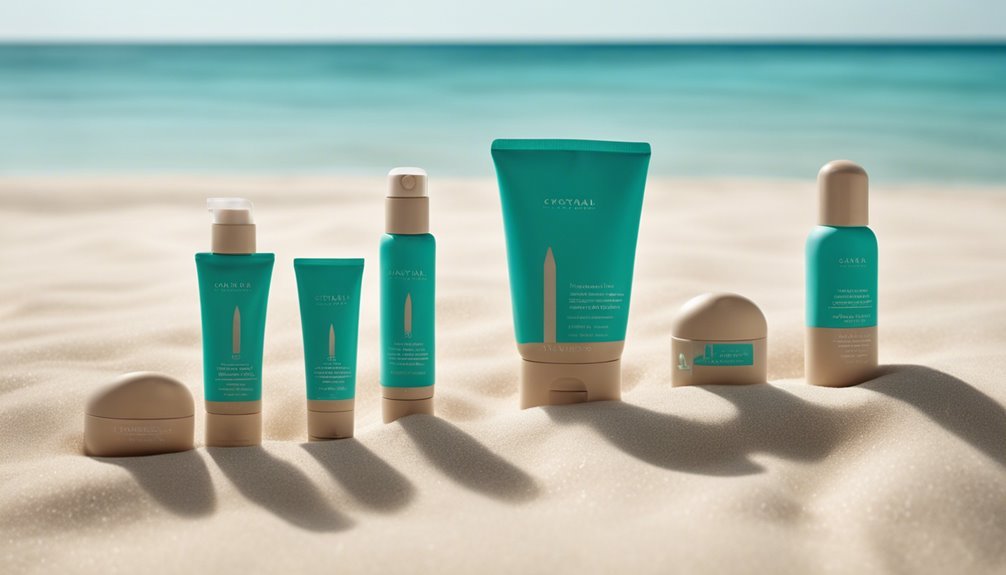
While addressing the needs of acne-prone skin with specific sunscreen choices, you might also consider exploring natural and organic options. These alternatives not only provide effective protection against harmful UV rays but also align with a more sustainable ethos, using natural ingredients and eco-friendly packaging.
Natural sunscreens typically feature ingredients like zinc oxide or titanium dioxide, which act as physical barriers to reflect sunlight. These ingredients are less likely to cause skin irritation or exacerbate acne, making them a great choice for sensitive skin types.
Moreover, they're reef-safe, offering a guilt-free solution to sun protection without harming marine ecosystems.
Organic options further elevate the health and environmental benefits by steering clear of synthetic chemicals and preservatives. They often incorporate plant-derived compounds, which can offer additional skin care benefits such as hydration and antioxidant protection.
The use of eco-friendly packaging reduces the environmental impact, featuring materials that are recyclable or biodegradable.
When choosing a natural or organic sunscreen, look for products that have broad-spectrum coverage and a suitable SPF rating to ensure comprehensive protection.
It's also wise to check for certifications like Non-GMO, cruelty-free, or organic, which authenticate the product's claims and help you make an informed, responsible choice.
Top Picks for Kids and Babies
Why should choosing the right sunscreen for kids and babies be a meticulous task? Their delicate skin is much more vulnerable to the sun's harmful rays and chemicals than adult skin. You're looking for products that blend safety with effectiveness—aiming to protect without causing irritation.
When selecting a sunscreen, prioritize child-friendly formulas specifically designed to be gentle yet effective. Look for mineral-based products containing zinc oxide or titanium dioxide. These ingredients form a physical barrier on the skin's surface, reflecting UV rays away from the body, unlike chemical sunscreens, which absorb these rays. Mineral sunscreens usually start working as soon as they're applied, an important factor when dealing with impatient little ones eager to play outside.
Additionally, opt for hypoallergenic options, which are less likely to cause allergic reactions or skin irritations. These formulations are often free from fragrances, parabens, and phthalates—common irritants in skincare products.
Water resistance is another key feature, ensuring the sunscreen stays effective through sweating or swimming.
Every application should be generous, covering all exposed skin and reapplied every two hours or immediately after swimming or excessive sweating. By choosing the right sunscreen, you're not just protecting their skin; you're nurturing their overall health and well-being.
Best Sunscreens for Sports Enthusiasts
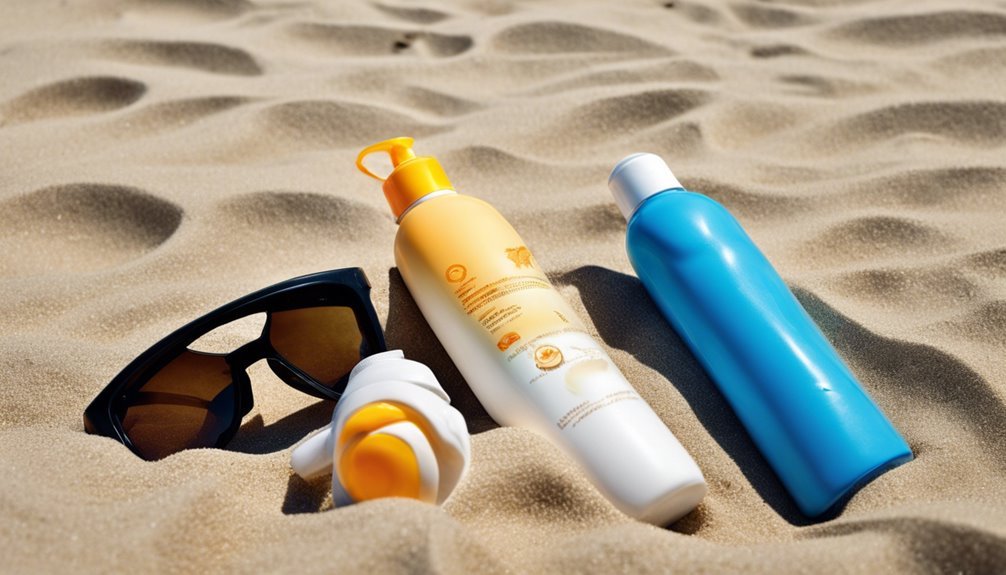
After ensuring the youngest family members are safeguarded with appropriate sunscreen, it's vital to address the needs of those who spend prolonged periods active in the sun, particularly sports enthusiasts.
You need a sunscreen that not only offers high UV protection but also stays effective despite sweating and water exposure.
When choosing a sunscreen, look for options that emphasize sweat resistance. This feature ensures that the sunscreen remains on your skin, maintaining its protective barrier even during intense physical activities.
Products labeled "water-resistant" are tested to hold up for either 40 or 80 minutes of sweating or swimming. For all-day tournaments or training sessions, opt for those with 80-minute resistance, as they'll require fewer reapplications.
Additionally, broad-spectrum sunscreens are essential. These protect against both UVA and UVB rays, reducing your risk of skin damage and cancer. A minimum SPF of 30 is advisable, though SPF 50 is preferred for long hours outdoors.
Lastly, while the texture of the sunscreen might be a personal preference, ensure it doesn't leave a greasy residue that could affect your grip or comfort in sports gear.
A non-comedogenic formula is ideal, as it won't clog your pores, a plus during sweat-inducing activities.
Sunscreen Sprays vs. Lotions
Choosing between sunscreen sprays and lotions often boils down to your personal preference and specific needs for sun protection.
You'll find that each type offers distinct advantages, depending on your activity and the level of convenience you seek.
Sunscreen sprays are prized for their ease of spray application, making them a quick and efficient choice for covering large areas of your body, especially when you're in a hurry.
They're excellent for reaching those hard-to-get spots like your back. However, it's crucial to apply them in a well-ventilated area to avoid inhaling aerosols, and you must ensure you're applying enough to cover all exposed skin thoroughly.
On the other hand, lotions might take a bit more time to apply due to their thicker lotion texture, but they often provide a more controlled and even coverage.
This makes it easier to know you've completely protected your skin. Lotions are also typically more moisturizing, which can be beneficial if you have dry skin or conditions like eczema.
Ultimately, whether you choose a spray or lotion, make sure the product is broad-spectrum, offers SPF 30 or higher, and is water-resistant if you're planning to swim or sweat.
This will ensure you're effectively shielded from harmful UV rays.
Sunscreens With Added Skincare Benefits
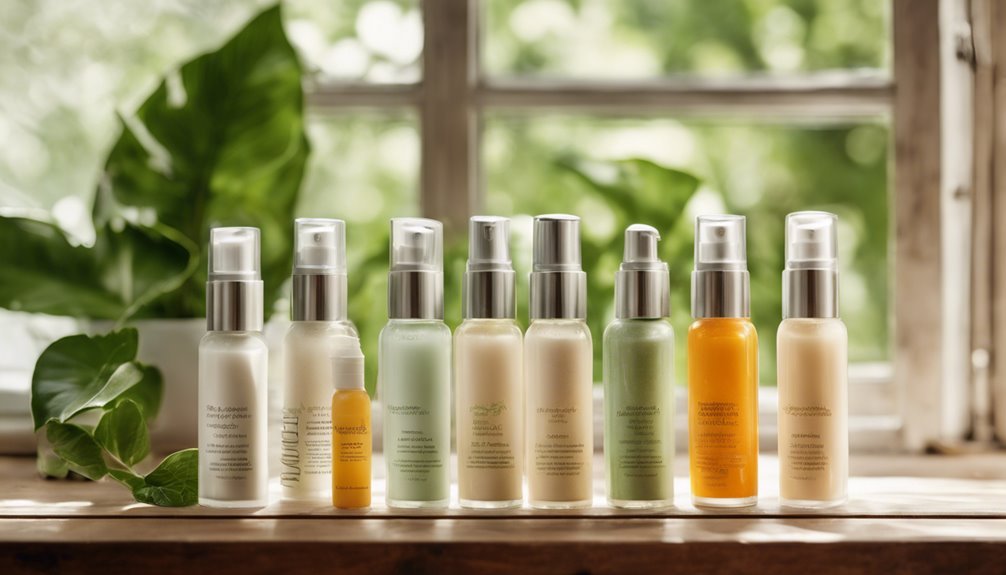
While selecting a sunscreen for UV protection is vital, many products now offer additional skincare benefits that cater to various skin health needs.
These formulations are designed to not only shield your skin from harmful UV rays but also to enhance skin health through a synergy of sunscreen ingredients and skincare elements.
You'll find sunscreens that incorporate antioxidants like vitamins C and E, which combat free radicals generated by UV exposure. This can help prevent premature aging and maintain your skin's youthful appearance.
For hydration, ingredients such as hyaluronic acid and glycerin are included, creating a product that moisturizes while it protects, making it ideal for those with dry skin.
Moreover, some sunscreens contain niacinamide and ceramides, which support the skin's barrier function, improving texture and reducing irritation.
This is particularly beneficial for sensitive skin types, as it enhances the skin's resilience against environmental stressors.
Best Budget-Friendly Sunscreens
Despite the high prices of some sunscreens, you don't have to break the bank to protect your skin from harmful UV rays. There are numerous affordable options that utilize effective ingredients to shield your skin, keeping it healthy and cancer-free without costing a fortune.
When you're shopping on a budget, look for sunscreens that boast broad-spectrum protection, meaning they guard against both UVA and UVB rays. These rays contribute differently to skin damage and cancer, making broad-spectrum products essential for comprehensive skin care.
Here are five budget-friendly sunscreens that offer robust protection:
- Economy Sun Guard: Packs a powerful SPF 50 with water resistance up to 80 minutes, ideal for long beach days.
- Value Shield Lotion: Contains antioxidants and natural extracts to soothe skin while providing SPF 30 protection.
- Discount Derm Protection Spray: Quick and easy application with a non-greasy finish, offering SPF 45.
- Budget Barrier Stick: Perfect for on-the-go application, this stick format with SPF 50 is easy to apply and fits in any bag.
- Thrift Essence Cream: Enriched with vitamins and moisturizers, offering SPF 35 and hydration for dry skin.
Each of these products features skin-friendly formulas with scientifically proven ingredients at a price point that allows you to serve yourself and others effectively.
Sunscreens for Face vs. Body
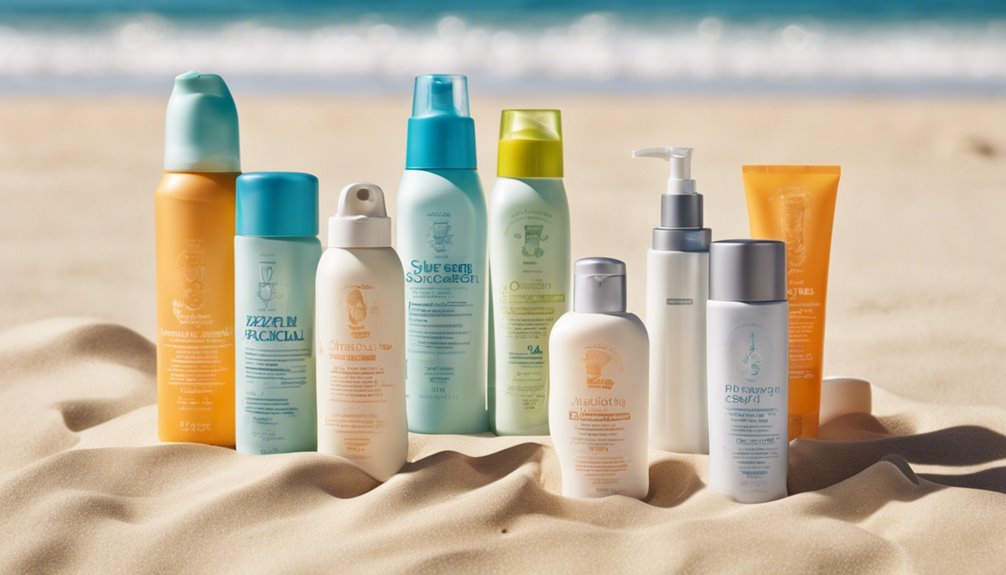
You mightn't think there's a big difference between sunscreens for your face and those for your body, but selecting the right type can significantly enhance your skin protection.
Face formulations are typically designed to be lighter and less oily, considering the delicate nature of facial skin and its susceptibility to acne. They often contain ingredients like zinc oxide or titanium dioxide, which provide broad-spectrum protection without clogging pores. Additionally, these formulations are usually fortified with antioxidants like vitamin C and E, which not only protect against UV rays but also fight against environmental pollutants.
Body lotions, on the other hand, are generally more robust. They're crafted to adhere well to the larger surface area of the body and withstand activities that involve more sweating or water exposure. While they also offer broad-spectrum protection, body sunscreens tend to be thicker and might leave a more noticeable residue, which generally isn't a concern when applied to areas other than the face.
Choosing the right sunscreen for each part of your body doesn't just prevent sunburn; it also minimizes skin aging and reduces the risk of skin cancer.
Latest Innovations in Sunscreen Technology
In the realm of sun protection, recent advancements have significantly improved the efficacy and user experience of sunscreens. As you explore the latest in sunscreen technology, you'll find that scientists and developers have been tirelessly innovating to ensure you can offer the best possible protection to those relying on these products.
Here are some of the most notable innovations:
- Enhanced Broad-Spectrum Formulas: New sunscreen formulations now provide even broader protection against UVA and UVB rays, reducing the risk of skin cancer and premature aging more effectively than ever before.
- Improved Photostability: UV filter advancements have led to sunscreens that remain effective longer when exposed to sunlight, ensuring continuous protection throughout the day without frequent reapplication.
- Eco-Friendly Options: Innovations include biodegradable formulas and non-nano zinc oxide that minimize environmental impact, particularly protecting marine life from harmful chemicals.
- Infrared and Blue Light Defense: Some sunscreens now also shield the skin from infrared radiation and visible light, particularly blue light from electronic devices, which are known to contribute to skin aging.
- Wearable Sunscreen Monitors: These small devices can be attached to your clothing and sync with a smartphone app to alert you when it's time to reapply sunscreen, making continuous protection more manageable.
These advancements in sunscreen formulations and UV filter technologies are setting new standards in sun protection, helping you keep those you care for safe and well-protected under the sun.
Frequently Asked Questions
How Often Should I Reapply Sunscreen During the Day?
To ensure optimal protection, you should reapply sunscreen every two hours.
If you're swimming or sweating heavily, it's crucial to apply more frequently.
Understanding sunscreen application and the importance of reapplication can safeguard your skin against harmful UV rays.
For those dedicated to serving others, like lifeguards or outdoor volunteers, maintaining rigorous sunscreen habits is essential, not only for personal health but also to model responsible behaviors in sun safety.
Can Sunscreen Cause Allergic Reactions?
Can you imagine being allergic to something meant to protect you? Yes, certain sunscreen ingredients can trigger allergic reactions.
If you're experiencing redness, itching, or blisters, you might be reacting to chemicals like oxybenzone or fragrances in your sunscreen.
It's crucial to check the label and opt for mineral-based options like zinc oxide or titanium dioxide, which are typically gentler on sensitive skin.
Always patch-test a new sunscreen before applying it fully.
Does Sunscreen Expire?
Yes, sunscreen does expire. You'll find expiration dates on the packaging, indicating the product's lifespan.
After this date, the active ingredients degrade, reducing the sunscreen's effectiveness. It's crucial to check these dates to ensure you're fully protected.
If there's no date, a general rule is to replace sunscreen every three years.
Using expired sunscreen can leave you vulnerable to sunburn and long-term skin damage, so it's best to stay updated.
Are There Sunscreens Safe for Coral Reefs?
Yes, there are sunscreens that are safe for coral reefs.
When you choose a sunscreen, look for products labeled as "reef-safe." These typically contain reef safe ingredients like non-nano zinc oxide or titanium dioxide, which have minimal environmental impact on marine ecosystems.
Avoid sunscreens with oxybenzone and octinoxate, as these chemicals can harm coral and marine life.
How Should I Store Sunscreen for Maximum Effectiveness?
To ensure your sunscreen remains effective, store it at a cool, stable temperature away from direct sunlight. Excessive heat can degrade active ingredients, reducing its protective capabilities.
Opt for opaque, tightly sealed containers that shield the contents from UV exposure and prevent contamination.
Check the expiration date regularly, as expired sunscreen won't provide adequate protection.
Conclusion
You've explored the spectrum, from high SPF warriors to gentle, skin-friendly shields. Whether diving into water-resistant types or dabbling with the latest tech-infused formulas, the right sunscreen melds safety with skin care. Don't skimp on protection—your skin deserves the best. Remember, a budget-friendly pick can still offer robust defense. So arm yourself wisely; it's not just about avoiding sunburn but embracing a healthier, radiant future. Choose well, apply often, and enjoy the sun safely.




